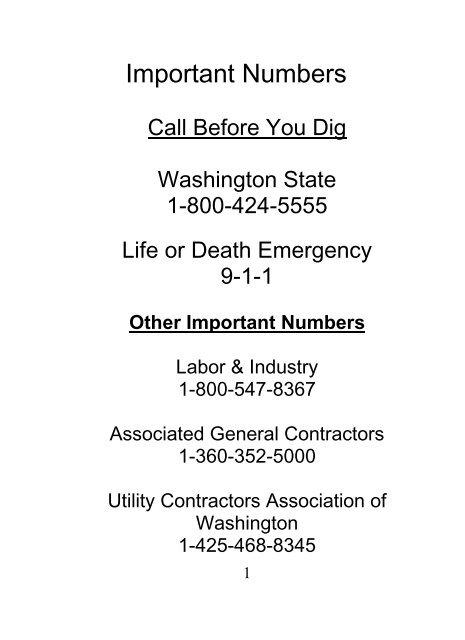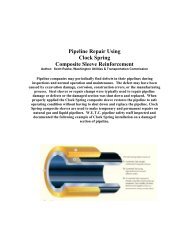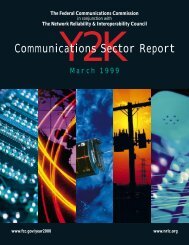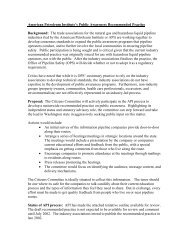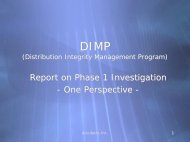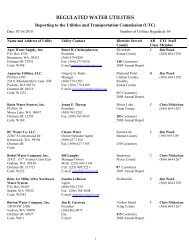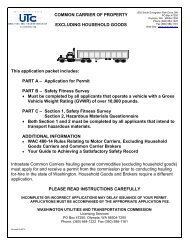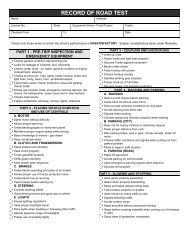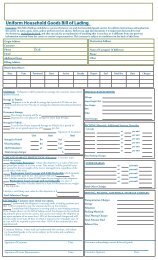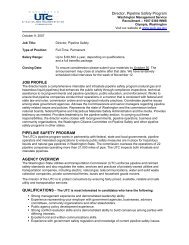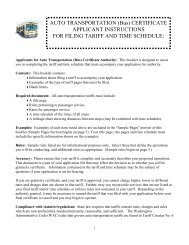Important Numbers - Washington Utilities and Transportation ...
Important Numbers - Washington Utilities and Transportation ...
Important Numbers - Washington Utilities and Transportation ...
Create successful ePaper yourself
Turn your PDF publications into a flip-book with our unique Google optimized e-Paper software.
<strong>Important</strong> <strong>Numbers</strong><br />
Call Before You Dig<br />
<strong>Washington</strong> State<br />
1-800-424-5555<br />
Life or Death Emergency<br />
9-1-1<br />
Other <strong>Important</strong> <strong>Numbers</strong><br />
Labor & Industry<br />
1-800-547-8367<br />
Associated General Contractors<br />
1-360-352-5000<br />
Utility Contractors Association of<br />
<strong>Washington</strong><br />
1-425-468-8345<br />
1
TABLE OF CONTENTS<br />
2
PREFACE<br />
The Guidelines set forth in this booklet were<br />
developed by the <strong>Washington</strong> <strong>Utilities</strong><br />
Coordinating Council. These guidelines <strong>and</strong><br />
suggested st<strong>and</strong>ards are clearly noted to be<br />
nationally recognized st<strong>and</strong>ards or laws.<br />
This booklet is available to all, in the State of<br />
<strong>Washington</strong>, as a means to help reduce<br />
damage to utilities, avoid interruption of<br />
service, <strong>and</strong> to protect the worker <strong>and</strong> the<br />
general public.<br />
Every effort has been made to assure the<br />
accuracy of the information.<br />
3
PURPOSE<br />
The <strong>Washington</strong> Utility Coordinating Council<br />
(WUCC) was originally established in 1972.<br />
It began in other forms as early as 1950<br />
when local utility forums were created.<br />
The purpose of this statewide organization of<br />
utilities, governmental agencies, contractors,<br />
excavators, <strong>and</strong> other interested<br />
organizations <strong>and</strong> individuals is to cooperate<br />
to reduce damages to utility facilities thereby<br />
promoting safety <strong>and</strong> protecting the public<br />
interest.<br />
Through communication, coordination, <strong>and</strong><br />
cooperation, the WUCC works to achieve the<br />
orderly planning <strong>and</strong> installation of<br />
underground facilities. Because more <strong>and</strong><br />
more utilities are being placed underground,<br />
communication, coordination, <strong>and</strong><br />
cooperation are vital.<br />
The WUCC continues to actively assist <strong>and</strong><br />
promote the formation of local utility<br />
coordinating councils.<br />
Go to: WWW. WUCC.ORG<br />
To Find Your Local UCC<br />
4
ONE CALL CENTERS<br />
There are three one-call organizations in<br />
<strong>Washington</strong> State, each unique in its own way,<br />
but dedicated to the same cause of damage<br />
prevention <strong>and</strong> safe digging. However, there is<br />
only one state call before you dig law (RCW<br />
19.122), one state toll-free call before you dig<br />
number (1-800-424-5555), <strong>and</strong> one call-center.<br />
The purpose of the call-center is to receive<br />
notification from anyone planning to dig, <strong>and</strong><br />
relay those notifications to the members that<br />
may have buried utilities in the area of the<br />
proposed excavation.<br />
Call before you dig is a free service. Costs<br />
associated with operating the one-call center<br />
are born by the companies that own <strong>and</strong>/or<br />
operate utilities in <strong>Washington</strong>.<br />
5
WHEN TO CALL<br />
RCW 19.122.030 Notice of excavation to<br />
owners of underground facilities…<br />
Before commencing any excavation,<br />
excluding agriculture tilling less than twelve<br />
inches in depth, the excavator shall provide<br />
notice of the scheduled commencement of<br />
excavation to all owners of underground<br />
facilities through a one-number locator<br />
service.<br />
RCW 19.122.020 Definitions.<br />
"Excavation" means any operation in which<br />
earth, rock, or other material on or below the<br />
ground is moved or otherwise displaced by<br />
any means, except the tilling of soil less than<br />
twelve inches in depth for agricultural<br />
purposes, or road <strong>and</strong> ditch maintenance<br />
that does not change the original road grade<br />
or ditch flowline.<br />
"Excavator" means any person who<br />
engages directly in excavation.<br />
”Notice” shall be communicated to the<br />
owners of underground facilities not less<br />
than two business days or more than ten<br />
business days before the scheduled date for<br />
commencement of excavation, unless<br />
otherwise agreed by the parties.<br />
6
RCW 19.122.020 Definitions.<br />
"Business day" means any day other than<br />
Saturday, Sunday, or a legal local, state, or<br />
federal holiday.<br />
RCW 1.12.040 Computation of time.<br />
The time within which an act is to be done,<br />
as herein provided, shall be computed by<br />
excluding the first day, <strong>and</strong> including the<br />
last, unless the last day is a holiday,<br />
Saturday, or Sunday, <strong>and</strong> then it is also<br />
excluded.<br />
From Cambridge Dictionary of English<br />
“day” a period of 24 hours from 12 o'clock<br />
one night to 12 o'clock the next night<br />
Sample computation of time:<br />
MON – Excavator calls 1-800-424-5555, at<br />
any time, to give notice of excavation <strong>and</strong><br />
request locates <strong>and</strong> marks. This day is<br />
excluded from notice.<br />
TUES – 1st business day begins this<br />
morning at 12 midnight<br />
WED – 2nd business day begins this<br />
morning at 12:00 midnight<br />
THUR – OK to begin digging from 12<br />
midnight on - if all known lines are marked<br />
7
AMERICAN PUBLIC WORKS ASSOCIATION<br />
UNIFORM COLOR CARD<br />
WHITE<br />
WUCC strongly recommends using white to<br />
mark the proposed excavation<br />
Pink<br />
Temporary survey markings<br />
Safety Red<br />
Electric power, lines, cables, conduit <strong>and</strong><br />
lighting cables<br />
High Visibility Safety Yellow<br />
Gas, Oil, Steam, Petroleum or Gasoline<br />
materials<br />
Safety Alert Orange<br />
Telephone <strong>and</strong> Telegraph Systems, Cable<br />
Television Systems, Police <strong>and</strong> Fire<br />
Communications<br />
Safety Precaution Blue<br />
Potable Water<br />
Safety Purple<br />
Reclaimed Water, Irrigation <strong>and</strong> Slurry Lines<br />
Safety Green<br />
All Sewer <strong>and</strong> Storm Drain lines<br />
8
RECOMMENDED MARKING GUIDELINES<br />
FOR UNDERGROUND UTILITIES<br />
Recommended marking guidelines from<br />
various professional organizations can be<br />
found at the following web-sites:<br />
AMERICAN PUBLIC WORKS ASSOCIATION<br />
www.pubworks.org<br />
AMERICAN PETROLEUM INSTITUTE<br />
www.api.org/cat<br />
NATIONAL UTILITY LOCATING CONTRACTORS<br />
ASSOCIATION<br />
www.nulca.org<br />
9
RCW 19.122<br />
NOTE: RCW 19.122.055 was amended in<br />
2001. The new language is included in this<br />
document.<br />
REVISED CODE OF WASHINGTON<br />
TITLE 19 BUSINESS REGULATIONS -<br />
MISCELLANEOUS<br />
CHAPTER 19.122 UNDERGROUND<br />
UTILITIES<br />
19.122.010 Intent.<br />
19.122.020 Definitions.<br />
19.122.027 One-number locator services--<br />
Single state-wide toll-free telephone number.<br />
19.122.030 Notice of excavation to owners<br />
of underground facilities--One-number<br />
locator service--Time for notice--Marking of<br />
underground facilities--Costs.<br />
19.122.033 Notice of excavation to pipeline<br />
companies.<br />
19.122.035 Pipeline company duties after<br />
notice of excavation--Examination--<br />
Information of damage--Notification of local<br />
first responders.<br />
19.122.040 Underground facilities identified<br />
in bid or contract--Excavator's duty of<br />
reasonable care--Liability for damages--<br />
Attorneys' fees.<br />
19.122.045 Exemption from liability.<br />
10
19.122.050 Damage to underground facility--<br />
Notification by excavator--Repairs or<br />
relocation of facility.<br />
19.122.055 Failure to notify one-number<br />
locator service--Civil penalty, if damages.<br />
19.122.060 Exemption from notice <strong>and</strong><br />
marking requirements for property owners.<br />
19.122.070 Civil penalties--Treble damages-<br />
-Existing remedies not affected.<br />
19.122.075 Damage or removal of<br />
permanent marking--Civil penalty.<br />
19.122.080 Waiver of notification <strong>and</strong><br />
marking requirements.<br />
19.122.900 Severability.<br />
RCW 19.122.010 Intent.<br />
It is the intent of the legislature in enacting<br />
this chapter to assign responsibilities for<br />
locating <strong>and</strong> keeping accurate records of<br />
utility locations, protecting <strong>and</strong> repairing<br />
damage to existing underground facilities,<br />
<strong>and</strong> protecting the public health <strong>and</strong> safety<br />
from interruption in utility services caused by<br />
damage to existing underground utility<br />
facilities.<br />
RCW 19.122.020 Definitions.<br />
Unless the context clearly requires<br />
otherwise, the definitions in this section<br />
apply throughout this chapter:<br />
11
(1) "Business day" means any day other than<br />
Saturday, Sunday, or a legal local, state, or<br />
federal holiday.<br />
(2) "Damage" includes the substantial<br />
weakening of structural or lateral support of<br />
an underground facility, penetration,<br />
impairment, or destruction of any<br />
underground protective coating, housing, or<br />
other protective device, or the severance,<br />
partial or complete, of any underground<br />
facility to the extent that the project owner or<br />
the affected utility owner determines that<br />
repairs are required.<br />
(3) "Emergency" means any condition<br />
constituting a clear <strong>and</strong> present danger to life<br />
or property, or a customer service outage.<br />
(4) "Excavation" means any operation in<br />
which earth, rock, or other material on or<br />
below the ground is moved or otherwise<br />
displaced by any means, except the tilling of<br />
soil less than twelve inches in depth for<br />
agricultural purposes, or road <strong>and</strong> ditch<br />
maintenance that does not change the<br />
original road grade or ditch flowline.<br />
(5) "Excavator" means any person who<br />
engages directly in excavation.<br />
(6) "Gas" means natural gas, flammable gas,<br />
or toxic or corrosive gas.<br />
(7) "Hazardous liquid" means: (a) Petroleum,<br />
petroleum products, or anhydrous ammonia<br />
12
as those terms are defined in 49 C.F.R. Part<br />
195 as in effect on March 1, 1998; <strong>and</strong> (b)<br />
carbon dioxide. The utilities <strong>and</strong><br />
transportation commission may by rule<br />
incorporate by reference other substances<br />
designated as hazardous by the secretary of<br />
transportation.<br />
(8) "Identified facility" means any<br />
underground facility which is indicated in the<br />
project plans as being located within the<br />
area of proposed excavation.<br />
(9) "Identified but unlocatable underground<br />
facility" means an underground facility which<br />
has been identified but cannot be located<br />
with reasonable accuracy.<br />
(10) "Locatable underground facility" means<br />
an underground facility which can be fieldmarked<br />
with reasonable accuracy.<br />
(11) "Marking" means the use of stakes,<br />
paint, or other clearly identifiable materials to<br />
show the field location of underground<br />
facilities, in accordance with the current color<br />
code st<strong>and</strong>ard of the American Public Works<br />
Association. Markings shall include<br />
identification letters indicating the specific<br />
type of the underground facility.<br />
(12) "Person" means an individual,<br />
partnership, franchise holder, association,<br />
corporation, a state, a city, a county, or any<br />
subdivision or instrumentality of a state, <strong>and</strong><br />
13
its employees, agents, or legal representatives.<br />
(13) "Pipeline" or "pipeline system" means all<br />
or parts of a pipeline facility through which<br />
hazardous liquid or gas moves in<br />
transportation, including, but not limited to,<br />
line pipe, valves, <strong>and</strong> other appurtenances<br />
connected to line pipe, pumping units,<br />
fabricated assemblies associated with<br />
pumping units, metering <strong>and</strong> delivery<br />
stations <strong>and</strong> fabricated assemblies therein,<br />
<strong>and</strong> breakout tanks. "Pipeline" or "pipeline<br />
system" does not include process or transfer<br />
pipelines as defined in RCW 81.88.010.<br />
(14) "Pipeline company" means a person or<br />
entity constructing, owning, or operating a<br />
pipeline for transporting hazardous liquid or<br />
gas. A pipeline company does not include:<br />
(a) Distribution systems owned <strong>and</strong> operated<br />
under franchise for the sale, delivery, or<br />
distribution of natural gas at retail; or (b)<br />
excavation contractors or other contractors<br />
that contract with a pipeline company.<br />
(15) "Reasonable accuracy" means location<br />
within twenty- four inches of the outside<br />
dimensions of both sides of an underground<br />
facility.<br />
(16) "Underground facility" means any item<br />
buried or placed below ground for use in<br />
connection with the storage or conveyance<br />
14
of water, sewage, electronic, telephonic or<br />
telegraphic communications, cablevision,<br />
electric energy, petroleum products, gas,<br />
gaseous vapors, hazardous liquids, or other<br />
substances <strong>and</strong> including but not limited to<br />
pipes, sewers, conduits, cables, valves,<br />
lines, wires, manholes, attachments, <strong>and</strong><br />
those parts of poles or anchors below<br />
ground. This definition does not include<br />
pipelines as defined in subsection (13) of this<br />
section, but does include distribution<br />
systems owned <strong>and</strong> operated under<br />
franchise for the sale, delivery, or distribution<br />
of natural gas at retail.<br />
(17) "One-number locator service" means a<br />
service through which a person can notify<br />
utilities <strong>and</strong> request field- marking of<br />
underground facilities.<br />
RCW 19.122.027 One-number locator<br />
services--Single state- wide toll-free<br />
telephone number.<br />
(1) By December 31, 2000, the utilities <strong>and</strong><br />
transportation commission shall cause to be<br />
established a single state-wide toll-free<br />
telephone number to be used for referring<br />
excavators to the appropriate one-number<br />
locator service.<br />
(2) The utilities <strong>and</strong> transportation<br />
commission, in consultation with the<br />
15
<strong>Washington</strong> utilities coordinating council,<br />
shall establish minimum st<strong>and</strong>ards <strong>and</strong> best<br />
management practices for one-number<br />
locator services consistent with the<br />
recommendations of the governor's fuel<br />
accident prevention <strong>and</strong> response team<br />
issued in December 1999. By December 31,<br />
2000, the commission shall provide its<br />
recommendations to the appropriate<br />
st<strong>and</strong>ing committees of the House of<br />
Representatives <strong>and</strong> the Senate.<br />
(3) One-number locator services shall be<br />
operated by nongovernmental agencies.<br />
RCW 19.122.030 Notice of excavation to<br />
owners of underground facilities--Onenumber<br />
locator service--Time for notice--<br />
Marking of underground facilities--Costs.<br />
(1) Before commencing any excavation,<br />
excluding agriculture tilling less than twelve<br />
inches in depth, the excavator shall provide<br />
notice of the scheduled commencement of<br />
excavation to all owners of underground<br />
facilities through a one-number locator<br />
service.<br />
(2) All owners of underground facilities<br />
within a one-number locator service area<br />
shall subscribe to the service. One-number<br />
locator service rates for cable television<br />
companies will be based on the amount of<br />
16
their underground facilities. If no one-number<br />
locator service is available, notice shall be<br />
provided individually to those owners of<br />
underground facilities known to or suspected<br />
of having underground facilities within the<br />
area of proposed excavation. The notice<br />
shall be communicated to the owners of<br />
underground facilities not less than two<br />
business days or more than ten business<br />
days before the scheduled date for<br />
commencement of excavation, unless<br />
otherwise agreed by the parties.<br />
(3) Upon receipt of the notice provided for in<br />
this section, the owner of the underground<br />
facility shall provide the excavator with<br />
reasonably accurate information as to its<br />
locatable underground facilities by surfacemarking<br />
the location of the facilities. If there<br />
are identified but unlocatable underground<br />
facilities, the owner of such facilities shall<br />
provide the excavator with the best available<br />
information as to their locations. The owner<br />
of the underground facility providing the<br />
information shall respond no later than two<br />
business days after the receipt of the notice<br />
or before the excavation time, at the option<br />
of the owner, unless otherwise agreed by the<br />
parties.<br />
Excavators shall not excavate until all<br />
known facilities have been marked. Once<br />
17
marked by the owner of the underground<br />
facility, the excavator is responsible for<br />
maintaining the markings. Excavators shall<br />
have the right to receive compensation from<br />
the owner of the underground facility for<br />
costs incurred if the owner of the<br />
underground facility does not locate its<br />
facilities in accordance with this section.<br />
(4) The owner of the underground facility<br />
shall have the right to receive compensation<br />
for costs incurred in responding to<br />
excavation notices given less than two<br />
business days prior to the excavation from<br />
the excavator.<br />
(5) An owner of underground facilities is not<br />
required to indicate the presence of existing<br />
service laterals or appurtenances if the<br />
presence of existing service laterals or<br />
appurtenances on the site of the construction<br />
project can be determined from the presence<br />
of other visible facilities, such as buildings,<br />
manholes, or meter <strong>and</strong> junction boxes on or<br />
adjacent to the construction site.<br />
(6) Emergency excavations are exempt from<br />
the time requirements for notification<br />
provided in this section.<br />
(7) If the excavator, while performing the<br />
contract, discovers underground facilities<br />
which are not identified, the excavator shall<br />
cease excavating in the vicinity of the facility<br />
18
<strong>and</strong> immediately notify the owner or operator<br />
of such facilities, or the one-number locator<br />
service.<br />
RCW 19.122.033 Notice of excavation to<br />
pipeline companies.<br />
(1) Before commencing any excavation,<br />
excluding agricultural tilling less than twelve<br />
inches in depth, an excavator shall notify<br />
pipeline companies of the scheduled<br />
commencement of excavation through a<br />
one-number locator service in the same<br />
manner as is required for notifying owners of<br />
underground facilities of excavation work<br />
under RCW 19.122.030. Pipeline companies<br />
shall have the same rights <strong>and</strong><br />
responsibilities as owners of underground<br />
facilities under RCW 19.122.030 regarding<br />
excavation work. Excavators have the same<br />
rights <strong>and</strong> responsibilities under this section<br />
as they have under RCW 19.122.030.<br />
(2) Project owners, excavators, <strong>and</strong> pipeline<br />
companies have the same rights <strong>and</strong><br />
responsibilities relating to excavation near<br />
pipelines that they have for excavation near<br />
underground facilities as provided in RCW<br />
19.122.040.<br />
19
RCW 19.122.035 Pipeline company duties<br />
after notice of excavation--Examination--<br />
Information of damage--Notification of<br />
local first responders.<br />
(1) After a pipeline company has been<br />
notified by an excavator pursuant to RCW<br />
19.122.033 that excavation work will uncover<br />
any portion of the pipeline, the pipeline<br />
company shall ensure that the pipeline<br />
section in the vicinity of the excavation is<br />
examined for damage prior to being<br />
reburied.<br />
(2) Immediately upon receiving information<br />
of third-party damage to a hazardous liquid<br />
pipeline, the company that operates the<br />
pipeline shall terminate the flow of<br />
hazardous liquid in that pipeline until it has<br />
visually inspected the pipeline. After visual<br />
inspection, the operator of the hazardous<br />
liquid pipeline shall determine whether the<br />
damaged pipeline section should be<br />
replaced or repaired, or whether it is safe to<br />
resume pipeline operation. Immediately upon<br />
receiving information of third-party damage<br />
to a gas pipeline, the company that operates<br />
the pipeline shall conduct a visual inspection<br />
of the pipeline to determine whether the flow<br />
of gas through that pipeline should be<br />
terminated, <strong>and</strong> whether the damaged<br />
pipeline should be replaced or repaired.<br />
20
A record of the pipeline company's<br />
inspection report <strong>and</strong> test results shall be<br />
provided to the utilities <strong>and</strong> transportation<br />
commission consistent with reporting<br />
requirements under 49 C.F.R. 195 Subpart<br />
B.<br />
(3) Pipeline companies shall immediately<br />
notify local first responders <strong>and</strong> the<br />
department of any reportable release of a<br />
hazardous liquid from a pipeline. Pipeline<br />
companies shall immediately notify local first<br />
responders <strong>and</strong> the commission of any<br />
blowing gas leak from a gas pipeline that has<br />
ignited or represents a probable hazard to<br />
persons or property. Pipeline companies<br />
shall take all appropriate steps to ensure the<br />
public safety in the event of a release of<br />
hazardous liquid or gas under this<br />
subsection.<br />
(4) No damaged pipeline may be buried until<br />
it is repaired or relocated. The pipeline<br />
company shall arrange for repairs or<br />
relocation of a damaged pipeline as soon as<br />
is practical or may permit the excavator to do<br />
necessary repairs or relocation at a mutually<br />
acceptable price.<br />
RCW 19.122.040 Underground facilities<br />
identified in bid or contract--Excavator's<br />
21
duty of reasonable care--Liability for<br />
damages--Attorneys' fees.<br />
(1) Project owners shall indicate in bid or<br />
contract documents the existence of<br />
underground facilities known by the project<br />
owner to be located within the proposed area<br />
of excavation. The following shall be deemed<br />
changed or differing site conditions:<br />
(a) An underground facility not identified as<br />
required by this chapter or other provision of<br />
law; <strong>and</strong><br />
(b) An underground facility not located, as<br />
required by this chapter or other provision of<br />
law, by the project owner or excavator if the<br />
project owner or excavator is also a utility.<br />
(2) An excavator shall use reasonable care<br />
to avoid damaging underground facilities. An<br />
excavator shall:<br />
(a) Determine the precise location of<br />
underground facilities which have been<br />
marked;<br />
(b) Plan the excavation to avoid damage to<br />
or minimize interference with underground<br />
facilities in <strong>and</strong> near the excavation area;<br />
<strong>and</strong><br />
(c) Provide such support for underground<br />
facilities in <strong>and</strong> near the construction area,<br />
including during backfill operations, as may<br />
be reasonably necessary for the protection<br />
of such facilities.<br />
22
(3) If an underground facility is damaged <strong>and</strong><br />
such damage is the consequence of the<br />
failure to fulfill an obligation under this<br />
chapter, the party failing to perform that<br />
obligation shall be liable for any damages.<br />
Any clause in an excavation contract which<br />
attempts to allocate liability, or requires<br />
indemnification to shift the economic<br />
consequences of liability, different from the<br />
provisions of this chapter is against public<br />
policy <strong>and</strong> unenforceable. Nothing in this<br />
chapter prevents the parties to an excavation<br />
contract from contracting with respect to the<br />
allocation of risk for changed or differing site<br />
conditions.<br />
(4) In any action brought under this section,<br />
the prevailing party is entitled to reasonable<br />
attorneys' fees.<br />
RCW 19.122.045 Exemption from liability.<br />
Excavators who comply with the<br />
requirements of this chapter are not liable for<br />
any damages arising from contact or<br />
damage to an underground fiber optics<br />
facility other than the cost to repair the<br />
facility.<br />
RCW 19.122.050 Damage to underground<br />
facility--Notification by excavator--<br />
Repairs or relocation of facility.<br />
23
(1) An excavator who, in the course of<br />
excavation, contacts or damages an<br />
underground facility shall notify the utility<br />
owning or operating such facility <strong>and</strong> the<br />
one-number locator service. If the damage<br />
causes an emergency condition, the<br />
excavator causing the damage shall also<br />
alert the appropriate local public safety<br />
agencies <strong>and</strong> take all appropriate steps to<br />
ensure the public safety. No damaged<br />
underground facility may be buried until it is<br />
repaired or relocated.<br />
(2) The owner of the underground facilities<br />
damaged shall arrange for repairs or<br />
relocation as soon as is practical or may<br />
permit the excavator to do necessary repairs<br />
or relocation at a mutually acceptable price.<br />
RCW 19.122.055 Failure to notify onenumber<br />
locator service--Civil penalty, if<br />
damages.<br />
(1) ANY PERSON who fails to notify the<br />
one-number locator service <strong>and</strong> causes<br />
damage to a hazardous liquid or gas pipeline<br />
is subject to a civil penalty of not more than<br />
Ten Thous<strong>and</strong> Dollars For Each Violation.<br />
(2) All civil penalties recovered under this<br />
section shall be deposited into the pipeline<br />
safety account created in RCW 81.88.050.<br />
24
RCW 19.122.060 Exemption from notice<br />
<strong>and</strong> marking requirements for property<br />
owners.<br />
An excavation of less than twelve inches in<br />
vertical depth on private noncommercial<br />
property shall be exempt from the<br />
requirements of RCW 19.122.030 if the<br />
excavation is being performed by the person<br />
or an employee of the person who owns or<br />
occupies the property on which the<br />
excavation is being performed.<br />
RCW 19.122.070 Civil penalties--Treble<br />
damages--Existing remedies not affected.<br />
(1) Any person who violates any provision of<br />
this chapter, <strong>and</strong> which violation results in<br />
damage to underground facilities, is subject<br />
to a civil penalty of not more than one<br />
thous<strong>and</strong> dollars for each violation. All<br />
penalties recovered in such actions shall be<br />
deposited in the general fund.<br />
(2) Any excavator who wilfully or maliciously<br />
damages a field-marked underground facility<br />
shall be liable for treble the costs incurred in<br />
repairing or relocating the facility. In those<br />
cases in which an excavator fails to notify<br />
known underground facility owners or the<br />
one-number locator service, any damage to<br />
the underground facility shall be deemed<br />
wilful <strong>and</strong> malicious <strong>and</strong> shall be subject to<br />
25
treble damages for costs incurred in<br />
repairing or relocating the facility.<br />
(3) This chapter does not affect any civil<br />
remedies for personal injury or for property<br />
damage, including that to underground<br />
facilities, nor does this chapter create any<br />
new civil remedies for such damage.<br />
RCW 19.122.075 Damage or removal of<br />
permanent marking-- Civil penalty.<br />
ANY PERSON who willfully damages or<br />
removes a permanent marking used to<br />
identify an underground facility or pipeline, or<br />
a temporary marking prior to its intended<br />
use, is subject to a civil penalty of not more<br />
than one thous<strong>and</strong> dollars for each act.<br />
RCW 19.122.080 Waiver of notification<br />
<strong>and</strong> marking requirements.<br />
The notification <strong>and</strong> marking provisions of<br />
this chapter may be waived for one or more<br />
designated persons by an underground<br />
facility owner with respect to all or part of<br />
that underground facility owner's own<br />
underground facilities.<br />
RCW 19.122.900 Severability.<br />
If any provision of this act or its application to<br />
any person or circumstance is held invalid,<br />
the remainder of the act or the application of<br />
26
the provision to other persons or<br />
circumstances is not affected.<br />
27
HOW TO CALL<br />
Marking Your Work Area in White<br />
is Strongly Recommended.<br />
1. What information do I need before I<br />
call 1-800-424-5555<br />
When you call, you will be asked a series of<br />
questions about your work-site. Being<br />
prepared greatly speeds up the process.<br />
Please have this information ready:<br />
* indicates required information. Even though<br />
not all the information is required, it is all<br />
helpful! However, if you do not have the<br />
information that is not required—just say “not<br />
known” <strong>and</strong> move on. It will save time.<br />
• * Your name, phone number,<br />
company name (if applicable), <strong>and</strong><br />
mailing address.<br />
• The name <strong>and</strong> phone number of an<br />
alternate contact person, in case<br />
the utilities have questions <strong>and</strong><br />
cannot reach you.<br />
• If the work is taking place within 10<br />
feet of any overhead power lines.<br />
• * What type of work is being done.<br />
• * Who is the work being done for.<br />
• * The county <strong>and</strong> city where the<br />
work is taking place.<br />
28
• * The address or the street where<br />
the work is taking place.<br />
• The nearest cross street.<br />
• The distance <strong>and</strong> direction of the<br />
work-site from the intersection.<br />
(If no address is provided, cross<br />
street, distance, <strong>and</strong> direction are<br />
required)<br />
• * Marking instructions, (specific<br />
instructions as to where the work is<br />
taking place. If work is in an<br />
isolated area, using l<strong>and</strong>marks as<br />
reference points helps the locators<br />
find your work-site; so does<br />
marking the job in white.)<br />
• Township, range, section, <strong>and</strong><br />
quarter section of the work-site.<br />
(These questions are asked so that<br />
the operator can determine which<br />
facility owners should be notified of<br />
your excavation plans, <strong>and</strong> which<br />
should not. This process makes<br />
sure that all known buried facilities<br />
at your work-site are located, <strong>and</strong><br />
the underground facility owners<br />
who do not have lines in your<br />
general area are not needlessly<br />
notified.)<br />
29
2. What happens when I call<br />
When you call, one of the friendly One-Call<br />
operators will ask you a series of questions<br />
about your work-site. (See question #1 for<br />
information needed to process a locate<br />
request) You will then be provided with a list<br />
of underground facility owners in your area<br />
that subscribe to the one-call system. Keep<br />
in mind, the law requires all owner/operators<br />
of underground facilities to subscribe, but not<br />
all have complied. You will also be given a<br />
time in which the underground lines are<br />
required to be marked along with a ticket<br />
number for your reference.<br />
It is advisable that you write that information<br />
down—especially the ticket number!<br />
• Knowing which underground facility<br />
owners were notified can help if you<br />
encounter a problem later; you will<br />
know whom to contact.<br />
• The utility companies have 2<br />
business days, after you call for a<br />
locate request, to mark their lines.<br />
Please wait until after this time to<br />
dig, so that their locators have<br />
enough time to respond. Not only<br />
does the law require the excavator<br />
not to begin digging until all known<br />
lines are marked - safety dem<strong>and</strong>s<br />
it.<br />
30
• The ticket number is proof that you<br />
called. If you need to call back for<br />
any reason, you will be asked for<br />
the ticket number. It is the only way<br />
the operators can reference your<br />
information. Your ticket number<br />
might be needed when contacting<br />
people other than the one-call<br />
center. For example, the utility<br />
companies might ask for your ticket<br />
number if you need to contact them<br />
about your locate request or<br />
excavation plans, or you might be<br />
required to provide your ticket<br />
number when applying for permits.<br />
The one-call center will transmit your locate<br />
request to each of the listed facility owners<br />
within 2 hours from the time you call. In the<br />
next 2 business days after the call (not<br />
counting weekends or holidays)<br />
representatives from those facilities are<br />
required to mark their underground lines.<br />
They can take longer if all parties agree.<br />
Once the time given to you by the One-Call<br />
operator has passed, <strong>and</strong> all known buried<br />
utilities are marked, you are ready to dig!<br />
31
3. Is there a charge for having the<br />
utilities marked<br />
No. Underground utilities in public owned<br />
right-of-way <strong>and</strong> easements are marked free<br />
of charge. However, the utilities will only<br />
mark the lines up to their own meters.<br />
Underground lines beyond the meter or<br />
service entrance belong to the property<br />
owner, <strong>and</strong> are that person's responsibility.<br />
There are many locator services that can<br />
mark privately owned lines. The One-Call<br />
center can refer you to a private locator in<br />
your area.<br />
However, the owner of the underground<br />
facility shall have the right to receive<br />
compensation for costs incurred in<br />
responding to excavation notices given less<br />
than two business days prior to the<br />
excavation from the excavator.<br />
32
“Our Advice For a Successful Excavation”<br />
Call* Before You Dig<br />
Wait Two Business Days Before Excavating<br />
Timely & Accurate Locates<br />
Don’t Excavate Until ALL Known Lines Are<br />
Marked.<br />
Call* to Report a “No Locate”<br />
Maintain Marks Until All Excavation is<br />
Complete.<br />
Adhere to Professional Excavation Methods<br />
*1-800-424-5555<br />
IT’S THE LAW<br />
33
RESOURCES<br />
<strong>Washington</strong> <strong>Utilities</strong> Coordinating Council<br />
www.wucc.org<br />
<strong>Washington</strong> Utility <strong>Transportation</strong> Commission<br />
www.wutc.wa.gov<br />
Common Ground Alliance<br />
www.commongroundalliance.com<br />
Dig Safely<br />
www.digsafely.com<br />
Associated General Contractors<br />
www.agcwa.com<br />
Utility Contractor Association of <strong>Washington</strong><br />
www.ucaw.org<br />
<strong>Washington</strong> Association of Sewer Water<br />
Districts<br />
www.waswd.org<br />
American Public Works Association<br />
www.pubworks.org<br />
www.locateaccurately.com<br />
www.callbeforeyoudig.org<br />
34
FREQUENTLY ASKED QUESTIONS<br />
1. If I have a scheduling emergency can<br />
I request an immediate locate<br />
It is in violation of RCW 19.122 to call in an<br />
emergency locate in an effort to "save<br />
time". Violators could be subject to<br />
additional locate costs <strong>and</strong> or civil penalty.<br />
2. If a company owns buried utilities but<br />
does not own locating equipment is<br />
the line considered an "Identified but<br />
unlocatable underground facility"<br />
A facility owner not possessing locating<br />
equipment does not qualify a facility as<br />
"unlocatable". Efforts must be made by the<br />
facility owner to locate the facility with the<br />
proper locating equipment <strong>and</strong> or<br />
potholing, before a facility can be identified<br />
as "Unlocatable".<br />
3. Who is notified of my planned<br />
excavating when I call 1-800-424-<br />
5555<br />
According to RCW 19.122.030, ALL owners<br />
of underground facilities within a onenumber<br />
locator service area shall subscribe<br />
35
to the service. This includes private parties<br />
with underground facilities that are located<br />
in the easements or utility right of way.<br />
ALL are required to locate <strong>and</strong> mark their<br />
buried utilities within two business days<br />
after being notified. <strong>Utilities</strong> that choose not<br />
to comply with the law are violators <strong>and</strong><br />
could be subject to lawsuits or civil<br />
penalties.<br />
4. Does the following section from RCW<br />
19.122.030 apply in all<br />
circumstances<br />
“(5) An owner of underground<br />
facilities is not required to indicate the<br />
presence of existing service laterals<br />
or appurtenances if the presence of<br />
existing service laterals or<br />
appurtenances on the site of the<br />
construction project can be<br />
determined from the presence of<br />
other visible facilities, such as<br />
buildings, manholes, or meter <strong>and</strong><br />
junction boxes on or adjacent to the<br />
construction site.”<br />
This only applies to "rigid facilities" that are<br />
not likely to deviate from a straight line<br />
from such visible facilities.<br />
36
5. I’m a sub-contractor hired by a larger<br />
contractor to excavate a small portion<br />
of a road project. If the larger<br />
company called for locates, do I need<br />
to call also<br />
YES. RCW 19.122.070 states that if damage<br />
occurs, any person in violation of any<br />
portion of the law is subject to a civil<br />
penalty of not more than one thous<strong>and</strong><br />
dollars for each violation (ten-thous<strong>and</strong><br />
dollars if a pipeline is damaged) <strong>and</strong> could<br />
be subject to lawsuits.<br />
6. I’m a homeowner. If I hire a<br />
excavator to dig postholes for a fence<br />
around my property – who is<br />
responsible for calling one-call<br />
The excavator. RCW 19.122.030 states that<br />
the excavator shall provide notice of the<br />
excavation. We recommend that you<br />
clearly cover this point with any excavator<br />
you hire to dig on your property.<br />
If you would like a visit to your company or<br />
work-site to answer further questions about<br />
RCW 19.122, or damage prevention efforts,<br />
please call 1-877-668-4001 <strong>and</strong> ask for the<br />
representative in your area.<br />
37
- end -<br />
PLEASE DIRECT COMMENTS OR<br />
QUESTIONS ABOUT THIS BOOKLET TO:<br />
<strong>Washington</strong> <strong>Utilities</strong> Coordinating Council<br />
10121 Evergreen Way STE 25 PMB 339<br />
Everett, WA 98204<br />
To order additional copies of this booklet<br />
please call 1-800-424-5555 <strong>and</strong> ask for the<br />
WUCC Recommended Guidelines. Copies<br />
will be sent to you at no charge while<br />
supplies last.<br />
38


